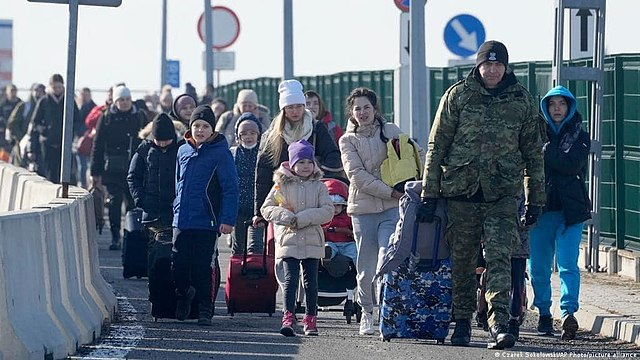
By Miles Cruger
Almost 4 million refugees have reportedly fled Ukraine since Russian troops entered the country on Feb. 24. The United Nations High Commissioner for Refugees, Filippo Grandi, tweeted on March 8 that Ukraine is “The fastest-growing refugee crisis in Europe since World War II ”.
Russian attacks on high population areas, including the capital city Kyiv, with a population of just over 3 million, making it the 7th most populous city in Europe, persist. The United Nations reported 977 civilian deaths as of March 23.
Refugees fleeing the war, mostly women and children, are attempting to find safety in other countries. At the time of publication 2,113,554 refugees have fled to Poland, 317,863 to Hungary, 253,592 to Slovakia, 252,376 to Russia, 543,308 to Romania, 367,913 to Moldova, and the rest have fled to other European Union countries. In Poland, some refugees waited for up to 60 hours before being able to cross the border.
Some civilians cannot evacuate due to the March 3 shelling of the Zaporizhzhia nuclear power plant. Workers must stay in order to keep the power plant functioning.
Regarding the attack on Zaporizhzhya, U.S. Ambassador to the U.N, Linda Thomas-Greenfield told the U.N. Security Council “By the grace of God, the world narrowly averted a nuclear catastrophe last night.”
Thomas-Greenfield also noted “The truth is that this war was one man’s choice and one man alone: President Putin. It was his choice to force hundreds of thousands of people to stuff their lives into backpacks and flee the country.” Russian forces have captured both Zaporizhzhia and the nuclear power plant and currently hold the area.
The current Ukrainian refugee crisis also brings up questions on how refugees ought to be treated by countries, especially as refugees from varying countries may be treated differently.
In Denmark, the Danish government is drafting legislation that will temporarily suspend asylum rules for Ukrainians. This legislation will allow Ukrainians to easily receive residency permits, meaning that “they can quickly start in school, on an education or in a job”, Rasmus Stoklund, the foreign affairs spokesperson for Denmark’s ruling Social Democratic Party, said.
However, the quick and welcoming response to Ukrainian refugees has highlighted the discrepancy in the treatment of refugees from other conflicts.
Despite their response to Ukrainian refugees, the Danish government is urging Syrian refugees from Damascus and surrounding areas to return to their country. The Damascus area is currently in the midst of a violent civil war, one that took the lives of over 3,700 people in 2021 alone, according to National Public Radio.
Michala Clante Bendixen, the head of Refugees Welcome Denmark, an organization that aims to create an easier asylum system, suggested that the Danish government puts a higher value on Ukrainian lives. He noted “If people arrive from Afghanistan or Syria, they will be met with suspicion, they will be called migrants until” they gain refugee status, Bendixen went on, “But now we immediately call Ukrainians refugees. What’s the difference?”
In addition, a “jewelry bill” was passed in Denmark in 2016 in response to Syrian refugees that allows the government to seize items from refugees to contribute to their welfare state.
A member of the party who helped pass this bill, the former Liberal Party immigration minister Inger Stojberg, spoke frankly in a post on Facebook about the refugee situation, “We might as well be honest about the fact that we would rather help Ukrainian refugees than Somalians and Palestinians. No one dares to say it like it is: It’s because the Ukrainians are more like us and because they are primarily Christians.”
Syrian refugees are being turned away, and are not included in Denmark’s plan to lift asylum regulations for Ukrainians. Both Ukraine and Damascus are dangerous areas— the difference in refugee treatment is rooted in racism.
